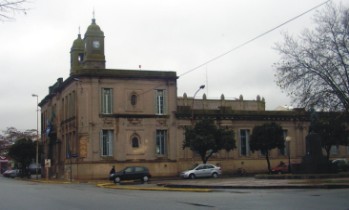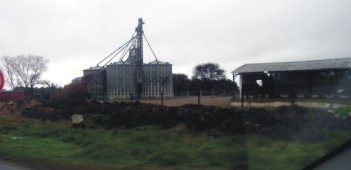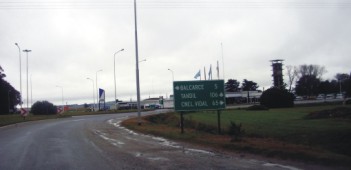General framework
The following is a summary of general guidelines the “Strategic Urban Development Territorial Plan of the Municipal District of Balcarce, Province of Buenos Aires”, Study 1.EG.148 of the Multi-sectorial Pre-investment Program III (BID Loan 1896/OC-AR), of the Inter-American Development Bank´s (IDB).
The Consultant Team´s task required by Balcarce municipal council is the formulation and implementation of a strategic plan that allows the overall development of the region and improves the living conditions of its inhabitants. It must also provide a set of planning and land management instruments that intend to establish urban and regional policies to develop an active role of the municipal council as promoter of sustainable economic development.



Consultant team
Executive Coordination
PhD. Arch. Guillermo Tella
Local Development
Lic. (Econ) Gustavo Mosto
Lic. (Geog) Diego Rodríguez
Urban Development
Arch. Martín Delucchi
Environmental Assessment
Arch. Manuel Ludueña
Urban Regulations
Lawyer Daniel Cassano
Lic. (Urb) Alejandra Potocko
Project Funding
Lic. (Econ) Oscar Bianchini
Graphic Production
Arch. Patricia Mayo
Arch. Victoria Jones
Cartographic Production
Cart. Mónica Tomas


Intervention in the southern pampas
Balcarce is a district in the southeast of the Province of Buenos Aires (Argentina). It borders the Municipalities of Mar Chiquita to the East, Ayacucho to the North, Tandil to the Northwest, Lobería to the Southwest, and General Alvarado and General Pueyrredón to the Southeast. Balcarce is one of the largest Municipalities of the Province, with a total area of 4.120 km2. It has a population of 42.000 inhabitants, which 83% of them live in urban areas and the remaining 17% is rural population.
It is located in an area called “Pampa austral” in a temperate zone. These features, along with the oceanic influence, contribute to its highly fertile soil, appropriate for the development of productive activities, such as agriculture and livestock. The characteristics of the topography define river basins, lagoons and hills, which determine its attractive natural landscape.



The head city of the Municipality of Balcarce, which bears the same name, lies in the centre and is linked to the surrounding area with a route network that allows a quick connection to nearby cities of economic and productive importance, at the regional and provincial scales, such as Tandil, Necochea and Mar del Plata, as well as the metropolitan area of Buenos Aires.
At the local scale, the urban population of Balcarce is distributed in six urban settlements, in which the most important city is Balcarce, that concentrates the highest percentage of urban population reaching 35000 people. Then, there are the towns of Napaleofú, Ramos Otero, Bosch, Los Pinos and San Agustín, all of remarkably smaller size.
Demographic data shows the primacy of the capital city over the rest of the Municipality. Then, it is worth asking what the reasons for such urban structure are? What is the potential to generate regional balance? And what benefits could it mean for the Municipality? Finally, what are the means to consolidate that particular structure?




How to plan for growth
The predominant activity was traditionally agricultural production and now continues to have a great importance, specially on potato, soybean and cereals production. Although less important, livestock takes place mainly in the northwest of the Municipality´s territory. On the other hand, mining includes active and inactive establishments of clay extraction.
However, in recent years the local economy is being diversified through industrial development, mainly in the metalworking and textile industries, and through the impulse in the services sector, primarily in tourism. Balcarse’s privileged position between the mountains and the sea, with a very attractive natural environment and the fact that it offers the possibility of developing recreational and outdoor activities, allows tourism to gain potential as increasing activity.


But this activity may generate conflict with others, such as primary and secondary ones. As for the equipment, the road network connects the towns of the Municipality and these with nearby cities. On the other hand, the rail service was disabled in the 90’s, succeeding the policies and actions implemented in the rest of the province and the country.
Regarding the basic urban services, the city of Balcarce has a surface covered by water supply and sanitation systems. Nevertheless, there are also sectors that are not connected, areas not covered or where service is inadequate. As to other equipments, it has health facilities, educational, cultural and recreational services.
In summary, Balcarce has many qualitative advantages which are opportunities for local development. Such advantages are: its strategic location as its productive capacity, its primary, secondary and tertiary
activities, its natural features and landscape.


Towards strategic development
A first approach to this area allows us to identify challenges to overcome and issues to address as potentially conflicting. Thus, for further development, sustainable over time and capable of improving the living conditions of its population, Balcarce must seize these opportunities and reverse those issues deemed as problematic.
Therefore, the formulation of a Territorial Strategic Development Plan for the Municipality of Balcarce appears as the ideal tool to achieve greater local development. It´s being done by a multidisciplinary consultant team in constant coordination with the municipal council and the main actors in the Municipality.
Its aim is to contribute to improving the living conditions of its inhabitants through the implementation of urban and regional policies, within strategies that encourage the preservation of environmental resources, socio-economic development and harmonious coexistence of different activities.
The Plan will determine the programs, projects and priority actions as support of sustainable development, to optimize opportunities and operate on weaknesses. The first phase will culminate in late 2011 and shows the commitment of the local government to improve the living quality of the community.



